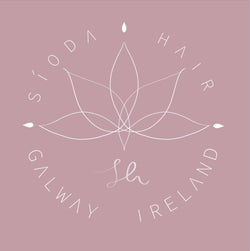An aspect that is rarely, if ever taken in to consideration when it comes to healthy hair is - sleep.
Amidst our fast-paced modern lives, what is often underestimated, is the profound impact poor quality sleep can have on our hair and of course overall well-being. Lets dive in to sleep as a whole for a deeper understanding!
Sleep transcends mere rest; it's a cornerstone of our health. During sleep, our bodies undergo vital processes, including physical restoration, memory consolidation, and hormone regulation. Lack of sleep can manifest in difficulties focusing, weakened immune systems, mood disorders, and heightened cardiovascular risks.
How much sleep do we need?
Experts recommend adults aim for 7-9 hours per night. Over a lifetime, this translates to a third of our existence spent in slumber. Throughout our sleep, we journey through various stages known as the sleep cycle, each crucial for daily bodily functions. This cycle consists of non-REM (Non-Rapid Eye Movement) and REM (Rapid Eye Movement) sleep, each with distinct characteristics and roles.
Let's delve into the stages of a typical sleep cycle:
Stage 1 (non-REM): Lasting 1-7 minutes, this initial stage sees a gradual relaxation of the body while brain activity begins to slow.
Stage 2 (non-REM): Spanning 10-25 minutes, this stage deepens relaxation with slowed breathing and heart rates, making up a significant portion of sleep time.
Stage 3 (non-REM): Lasting 20-40 minutes, this is deep sleep, where waking becomes challenging, crucial for restorative rest.
Stage 4 (REM): This phase, lasting 10-60 minutes, is characterized by heightened brain activity akin to wakefulness, alongside temporary muscle paralysis except for the eyes and breathing muscles.
How does all this relate to hair health?
The adage of "beauty sleep" holds some truth backed by science. Quality sleep is as essential for hair as a balanced diet and exercise. Sleep deprivation triggers stress responses, including increased cortisol production, leading to excessive oil production at the hair roots and potential hair issues.
Stress and poor sleep directly impact hair growth. Stress prompts cellular responses that can hinder hair health. Adequate sleep acts as a vital counterbalance, aiding in stress regulation and preventing stress-induced hair loss.
However, the relationship between sleep and hair health isn't solely about deprivation. The crux lies in stress management. Stress, not solely sleep deprivation, is a primary contributor to hair issues.
Struggling to get adequate sleep? You're not alone. Stress often disrupts sleep patterns. Here are 5 tips to improve sleep quality:
- Maintain a consistent sleep schedule.
- Create a conducive sleep environment.
- Limit screen time before bed.
- Incorporate regular physical activity.
- Avoid stimulants like caffeine and nicotine before bedtime.
Here are 5 more tips on how Síoda products can help with your sleep.
- Mulberry Silk Pillowcase - comfort is key when it comes to sleep and there’s nothing more comfortable than sleeping on the softest fabric known to the world
- Mulberry Silk Hair Wrap - Fancy more time in bed in the mornings? Our hair wrap saves time in the mornings encasing your hair in its existing style to make sure it lasts. Wrapped and protected in silk, this prevents frizz and bedhead. Less time restyling more time for that beauty sleep.
- Mulberry Silk Styler - Same but different, our silk styler works to extend your curls over night or can be used over night on pre washed hair dried 90-95% to create a soft wave. Less time styling, no need for heat. Win Win.
In essence, sleep isn't just about beauty; it's integral to overall health, including hair vitality. Incorporating the right products can help with sleep quality all the while helping to strengthen and style your hair while you sleep!

